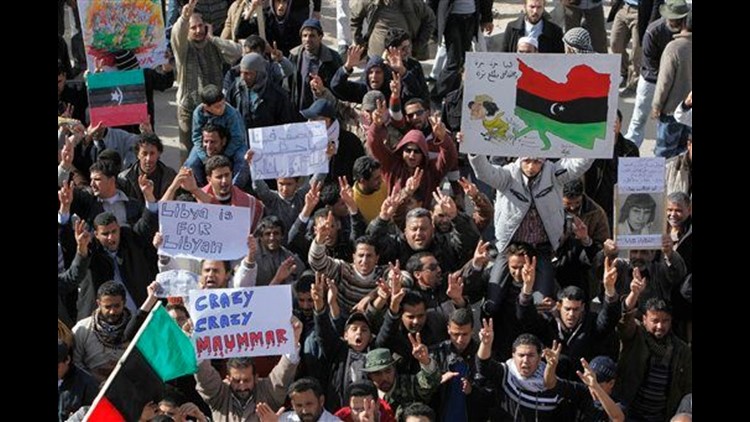CAIRO (AP) — Muammar Qaddafi never trusted his own army.
So Libya's leader of 41 years kept his military weak to prevent any serious challenges to his rule.
With money and patronage, he seeded supporters in key posts. He built up militias and armed "revolutionary committees" that are the final line of support for him and his powerful sons.
They are expected to fight for him if the regular military forces turn against him.
This is what is allowing him to hold onto the capital of Tripoli, while large parts of the vast, desert country outside the capital fall quickly to anti-government protesters.
It's also why the uprising in Libya will not go the way of Egypt and Tunisia, where a disciplined, organized, military stepped in, pushed authoritarian leaders out and spared their nations serious turmoil.
The uprisings in Egypt and Tunisia — Libya's neighbors to the east and west, respectively — led relatively cleanly to the ouster of their leaders. Libya, on the other hand, already is deadlier, more complicated.
With Qaddafi lashing out with full force and half his country broken away, the North African nation could fragment or fall into bloody civil war.
A sparsely populated desert nation with most of its 6 million population strung along a porous Mediterranean coast, Libya has many fissures.
Tribal loyalties are strong and could eventually decide the fate of the regime. Qaddafi spent many of his years cementing his hold on power. So, besides weakening the army and strengthening loyal militias, he used the country's vast oil and gas wealth to co-opt tribes. He gave them cash, perks and jobs, and fostered blood ties with intertribal marriages.
Qaddafi denied his people basic rights, cracked down harshly on any hint of dissent and squandered the country's wealth on nations and tribes across sub-Saharan Africa. Libyans have so much pent-up anger that freeing themselves from Qaddafi would likely trigger a tidal wave of jubilation and chaos, relief and lawlessness.
The maverick leader also has unleashed foreign mercenaries against the protesters, with witnesses in Tripoli and elsewhere reporting fighters from other African countries used to quell the uprising shoot at protesters.
Analysts say the recruitment of mercenaries from Sub-Saharan African nations began in the 1980s as a secret program, but their presence in Libya was uncovered in recent years. The exact number is not known, but they are believed to be in the hundreds.
Qaddafi's use of excessive force has so far helped him maintain control of Tripoli, but the fall earlier this week of the oil-rich eastern part of Libya at the hands of protesters could produce an enduring standoff,
In contrast to Egypt's Hosni Mubarak and Tunisia's Zine El Abidine Ben Ali, who stepped down in the face of popular uprisings to avoid more serious turmoil, Qaddafi vowed to fight to his "last drop of blood," exhorting his supporters to strike back against the demonstrators.
The U.N. Security Council has condemned the crackdown and demanded that violence against civilians end immediately. It also "deplored the repression against peaceful demonstrators, and expressed deep regret at the deaths of hundreds of civilians."
The statement suggests the international community does not yet believe the situation in Libya is serious enough for a move toward declaring the eastern part of the country an internationally protected area, enforcing a no-fly zone or drawing a line that Qaddafi's loyal forces could only cross at their peril.
But the idea could gain traction if Qaddafi makes good on his vow to fight on.
Libya expert George Joffe, who lectures at England's Cambridge University, believes Qaddafi has the military muscle to fight on, with an estimated 120,000-member force that include well-armed militias fiercely loyal to him and which stand to lose the most if his regime falls.
"Qaddafi can continue to fight for as long as he wants so long as the forces available to him are not hit by desertions," he said, singling out Qaddafi's Revolutionary Committees as among his most powerful militias.
The analysts said Qaddafi, who seized power in a 1969 military coup when he was 27, has deliberately neglected the 50,000-member army to diminish its ability to topple him. Instead, he has spent lavishly on arms and perks for militias loyal to him and his sons.
"The army has been kept poorly armed and with poor equipment and seen as being a threat to the regime," said Libya expert Charles Gurdon, managing director of the London-based risk consultancy Menas Associates.
Added Libya expert Henry Schuler: "Qaddafi keeps the army incapable of doing anything against him."
His tactics include making as little fuel as possible available to units of suspect loyalty, as well as denying them live ammunition, Schuler said.
"Qaddafi never trusted his own army," he said.
As far as endgame scenarios for Libya are concerned, there are several variants.
Fighting to the end, as Qaddafi threatened Tuesday night, could leave an ungovernable nation, divided along tribal or regional lines, its energy wealth unusable or destroyed, said Saad Djebbar, a London-based Libyan international law expert.
It's a bleak scenario that Seif el-Islam, the most visible of Qaddafi's sons, put forth in a speech earlier this week as a way of scaring the protesters.
The eastern part of Libya, a large swath of land that includes the relatively big cities of Benghazi, Sirte and Tobruk, has a reputation for being a bastion of resistance. It was the last part of the country to fall under the control of Italian colonizers early in the last century.
Its history, says Schuler, a retired U.S. diplomat who once served in Benghazi, gives it a sense of unity and uniqueness.
"The people of the east have a claim to dignity that Qaddafi has been trying to take away from them," said Schuler, who noted that one chant used by Benghazi protesters was borrowed from Libya's legendary anti-Italian fighter Omar al-Mukhtar: "Live in dignity or die in dignity."
Another option is for the country's eastern part to break away as an autonomous region, similar to one created in Iraq's Kurdish areas in the wake of the 1991 Gulf War.
Qaddafi could also be indicted for crimes against humanity and eventually removed from power to stand trial before the International Criminal Court in The Hague.
"Alternatively, the international community can offer Qaddafi an exit by granting him and his family immunity and they leave the country," sparing more bloodshed, Djebbar said.
Copyright 2011 The Associated Press.



